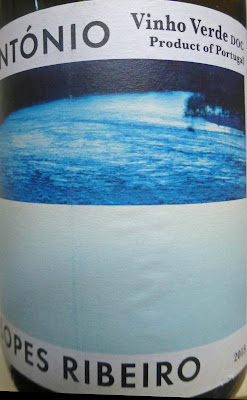 O'Briens October promotion is now in full swing, with reductions on dozens of wines from around the world ranging from 8 to 40 per cent until 28th October. Watch out too for their upcoming Italian Sale (16th to 28th October). My three top picks include a couple of loveable Italians.
O'Briens October promotion is now in full swing, with reductions on dozens of wines from around the world ranging from 8 to 40 per cent until 28th October. Watch out too for their upcoming Italian Sale (16th to 28th October). My three top picks include a couple of loveable Italians.
There’s a bee dancing on the label here, letting other bees know the orientation of a food source. I’ll do a little dance too and let you know about a very lovely wine indeed. The wine in the bottle is influenced by the bees also, with the fermentation yeasts carefully selected from the pollen the bees collect in the wildlife parks surrounding the vineyards.
Very light straw colour, clean and bright. Aromas are of light intensity, more floral than fruity. Lightly apple flavoured (more citrusy if it warms up a bit in the glass) with a noticeable acidity, it is light and crisp and easy to drink. Light seafood dishes are a suggested match. Perhaps with a Goatsbridge trout salad.
This wine comes from Cantina Orsogna in the mountainous Abruzzo region of eastern Italy. This cooperative specialises in crafting organic and sustainable wines from local grape varieties. The Vola Volé range of wines are dedicated to the protection of bees by protecting their habitat from pesticides and herbicides and is certified by Biodiversity Friend.
Trebbiano is known as Ugni Blanc in France, grown mainly for the Cognac and Armagnac distilleries. According to Wine-Searcher, its high acidity acts as a natural antiseptic, keeping the grapes and wines free from bacterial spoilage, a natural substitute for sulphur, handy as sulphur is not compatible with brandy making.
This is another Italian bottle with an eye-catching design. The agave grows widely in Sicily and the relatively new owners here took inspiration for the Nerello Mascalese design from the plant as a symbol of the Sicilian landscape. Indeed, the designs on all the Nostru range are based on symbols of local culture and life, as expressed in authentic Sicilian Majolica ceramics.
Likewise, the wine is made “in the most traditional and natural way to reflect the true character of the estate’s terroir and its grape varieties” Their methods include fermentation in terracotta. And their ambition is to rediscover precious varieties from Sicily’s past including this “Nerello Mascalese grape, the prince of native red grape varieties of Mount Etna.”.
Eye-catching label aside, this fresh and light wine has a ruby robe, towards the dark side. Red berries and a hint of spice in the complex aromas. It is fresh and lively, again that spice and fruit, elegant with silky smooth tannins, harmony throughout right to a very satisfying finish. Another excellent Italian.
Emiliana are the largest producers of estate grown organic wines in the world and this organic Viognier comes from their Casablanca Valley vineyards.
Thirty-five per cent of it is aged in French oak for 5 months. I remember drinking Viognier first years ago down in the Languedoc area during family holidays. I was probably buying the cheap stuff from the bottom shelf and didn’t particularly like the sweetish flavours of the liquid. At the time, I was never sure either about the pronunciation (vee·o·nyei - hear it here). But you need have no worries about this beauty.
Light straw colour with hints of green, very bright and clean looking in the glass. Aromas are complex, exotic fruits (mango, pineapple, etc) with blossom notes as well. Palate too is intense, lush fruit and a touch of honey but also well balanced through to a long and pleasant finish.
Other tips!
Jadot make wines in Burgundy and also in neighbouring Beaujolais. Fleurie is one of the ten crus in the latter region and straightaway you notice its bright light red colour. It is one hundred per cent Gamay. Red fruits, acidity, some tannins, well balanced. A lovely drop as we might say around here.
The province of Marlborough has long been recognised as ideal for the growing of Pinot Noir and here winemaker Simon Waghorn takes full advantage of the local advantages: leafy vineyards, ripe fruit and cool climate growing.
Aromas are cheerful, ripe fruits (cherry and berry). Full bodied, flavours of plum and brambly fruits, well balanced, the oak (11 months of it) harmoniously integrated, supple and silky in a long and totally satisfying finish.
From Portugal’s Duoro comes the gorgeous Tons de Duorum Red. No shortage of ripe fruit flavours on the elegant palate, refreshing with a little spice there too, fine tannins and a lovely soft finish.
The grapes are grown high up in circles around the top of the craters on Santorini, one of the Greek islands. Sometimes wines from hot climates lack acidity, but that is not the case here. Try it with shellfish, also smoked fish. Well worth a try!
This is a star from the Loire. Not that you’d know it from the pale straw colour. The magic starts with the aromas, intense, white fruit and floral notes, minerality and more, full of promise. And that promise is handsomely delivered on the palate.
Tacchetto Bardolino Classico 2014, 12.5%
This has a very light red colour and indeed is nice and light in many respects, including the fragrant fruity aromas. It is fresh and fruity too on the palate, a little spice too, good acidity and quite a long finish, a beautiful light, smooth easy-drinking wine, good either with or without food.


























